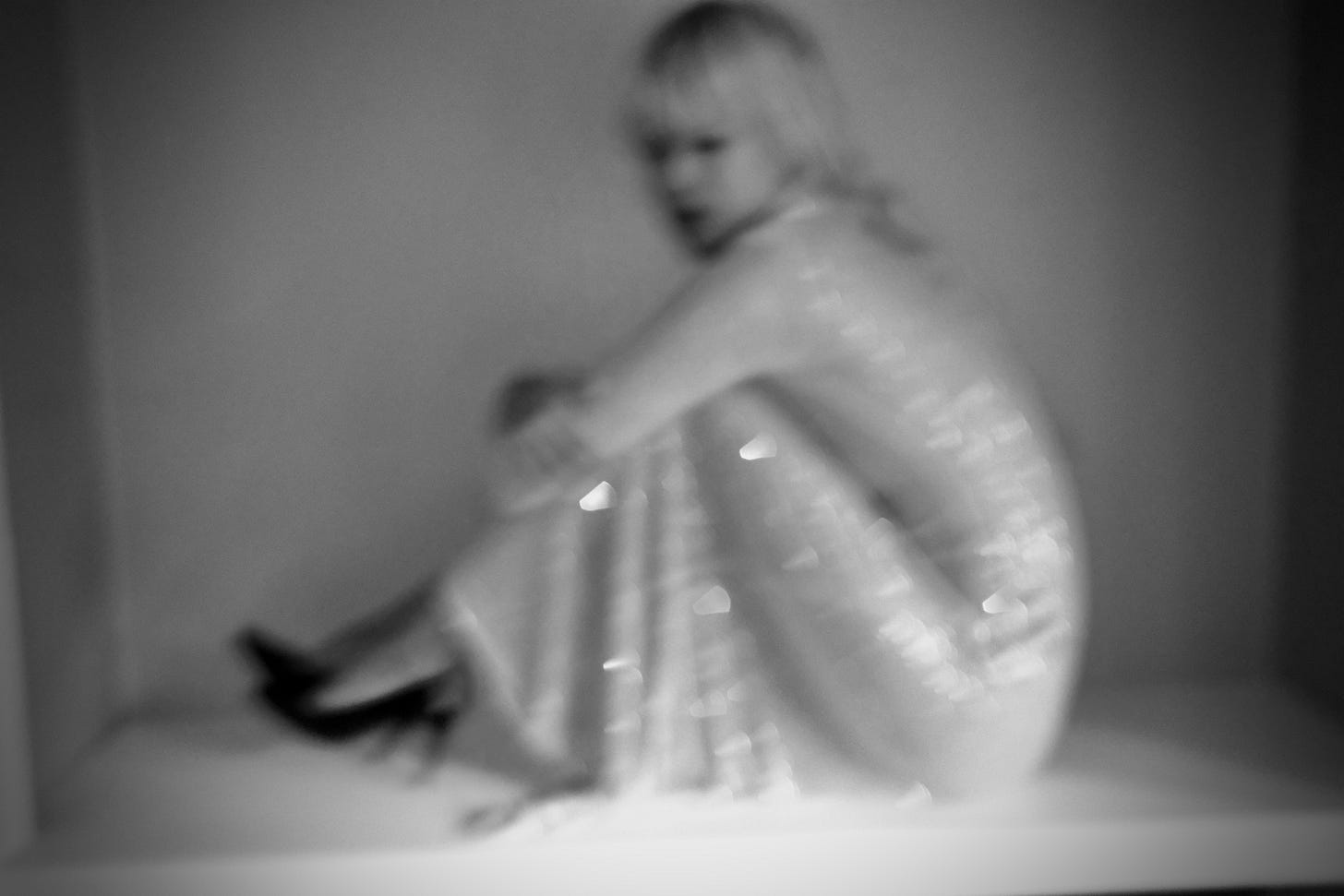Notes From a Taper
Morning dread feels like personality, not withdrawal.
photo by hunter mars
Author’s note: This piece was written during a period of withdrawal and instability. I’m safe now and under care. I’m keeping it up because the writing is honest, and because I want it to exist as a record of what it costs to come back to yourself
The most humiliating part of addiction — and of bad men, bad breath, debt, death — is believing it won’t happen to me. I was supposed to be sharper. Scrappier. Immune. A quarter Xanax after a breakup seemed almost self-care. Then a quarter became a half, a half a bar, then two. Somewhere, the count disappeared. I moved for months through rooms polished and competent, high-masking.
Now the taper has begun, and I’m on the floor. Sweating. Teeth chattering, golem without his ring, and salivating as I watch the clock for Valium, which is meant to be safer but feels like nothing. I call friends and sound fine — better than fine, funny even. They tell me I’m brilliant. Their words don’t land. I catalogue failures: a burden, a problem without resolution.
It isn’t my fault; I know the facts. Things that were done to me, I won’t write about today. One day I will. Therapy hasn’t fixed it. I loop my own thoughts, alone, trying to piece together what’s happened. My mother said there’s a god inside each of us. Mine feels absent. Or defective. Or cruel.
You can be beautiful, striking even, and the world softens: doors open, free matcha for a smile. Life is both easy and hard. Then I am home, alone, touching objects so I don’t go still. If I stop, I sleep; if I sleep, I don’t know when I’ll wake. I keep odd hours, like an otter handed too many marbles — trying to hold it all until the stones slide loose and scatter.
We all think we know what benzodiazepines do: “habit-forming,” “short-term only.” The chemistry is quieter and more exacting. These drugs are positive allosteric modulators of the GABA-A receptor — the brain’s brake. They make it easier for the calming chemical to slow neurons. Panic eases. Sleep comes. It feels like safety because, chemically, it is.
The brain adapts fast. Within weeks, it downregulates those receptors and pushes excitatory circuits harder to keep equilibrium. The pill that soothed no longer registers; you add a little more. Dependence is cellular long before you know its name. Stop too quickly and the unopposed excitation surges: rebound anxiety sharper than the original, tremor, sweating, heart racing, seizures. Each stop–start is said to make the next withdrawal harsher — a kindling pattern — so clinicians taper slowly, sometimes crossing to diazepam to let neurons rebuild their brakes molecule by molecule.
Other costs appear almost politely: the loss of short-term memory, attention that frays, learning that stalls. Studies show dampened plasticity in the hippocampus and prefrontal cortex — the circuits meant to form memory and unlearn fear. Anxiety deepens even as sedation dulls it. Nights blur; morning dread feels like personality, not withdrawal.
Friends tell me I repeat stories. Once, story was my sharpest instrument; now anecdotes slide mid-telling. They smile kindly. I feel the small hot humiliation of forgetfulness inside a life built on memory.
None of this is moral failure. Dependence is biology: push the brake and the body builds an accelerator. Knowing that doesn’t erase shame, but it maps the terrain. My lapses aren’t laziness; they’re neuroadaptation. My looping anxiety isn’t proof I’m broken; it’s a nervous system relearning balance.
Recovery is procedural. You taper in slivers because neurons need time. You weather the long tail when tiny shocks can reignite withdrawal. You relearn sleep. You let the brain build its own brakes again.
Identity shifts with the chemistry. I am no longer invincible or hyper-functional. Some friendships thin; some hold. But sometimes a sentence cuts clean and someone laughs, and I glimpse the quick, bright woman under the fog.
Even when memory stutters and stories repeat, I write. It’s the one thing the drug couldn’t touch: the urge to map both the science and the shame, and to make a life from what’s left.
Resources for help:
911 - This is for emergencies only. Fastest response, but only use is self harm is imminent. Will likely result in a mandatory 72 hour hold
988 - This is the primary 24hr Suicide Emergency line. They can offer phone counseling, and can dispatch medical teams to come out to assess and offer in person help, or assist in bringing you to a hospital if necessary. No mandatory 72hr holds
(800) 854-7772 - LA County Department of Mental Health ACCESS number. No mandatory 72hr holds
741741 - Text “HOME” - Crisis Text Line, similar to 988. No mandatory 72hr holds
(310)-889-7200 - National line for mental illness, NAMI
Medications and Benzo Replacement Services
Urgent Care for Psychiatric Medications
Exodus Recovery Mental Health Urgent Care Center
1920 Marengo St, Los Angeles, CA 90033
(323) 276-6400



Thank you 🫡